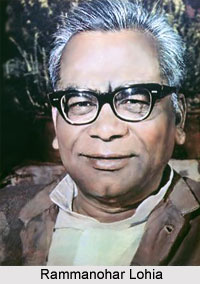 Rammanohar Lohia was a leader but a man of simple living. He disliked ostentation. His main aim was to fight for a cause, and help India to gain freedom. He admonished the caste system that prevailed in the country. He felt any one who has wealth or belongs to one of the higher castes or knows English could prosper. But, on the contrary, there are millions in this country who are not so fortunate. Hence he always felt that the Government should reserve sixty percent of jobs for women and people belonging to backward communities. The same policy should apply to places in political life. This was the firm stand of Rammanohar Lohia.
Rammanohar Lohia was a leader but a man of simple living. He disliked ostentation. His main aim was to fight for a cause, and help India to gain freedom. He admonished the caste system that prevailed in the country. He felt any one who has wealth or belongs to one of the higher castes or knows English could prosper. But, on the contrary, there are millions in this country who are not so fortunate. Hence he always felt that the Government should reserve sixty percent of jobs for women and people belonging to backward communities. The same policy should apply to places in political life. This was the firm stand of Rammanohar Lohia.
Equal Opportunity for People
Equality of opportunity - this is a sound principle. But when people who have been oppressed for ages are asked to compete with people belonging to forward communities the latter are bound to succeed. Hence it is but right that those who are backward should be given special opportunities. Rammanohar Lohia based all his programs on this doctrine.
Life in Jail for Rammanohar Lohia
In 1936, Rammanohar Lohia was elected a member of the All India Congress Committee. He travelled all over the country and drew young men into the freedom movement. The British imprisoned him in 1938 in Kolkata on charges of sedition. The Second World War broke out in 1939. The British Government forcibly involved India in the war. Rammanohar Lohia was against the war. For his antiwar speeches, the British again put him behind the bars in 1940.
It was 1942. Gandhi gave a call to the nation and threw a challenge to the British. "Quit India" said he. On the seventh and the eighth of August that year, the All India Congress Committee met in Mumbai. The Quit India Movement was launched. On the 9th of August early in the morning the British Government imprisoned all national leaders headed by Mahatma Gandhi, who coined a magic slogan, "Do or die". Spellbound by this slogan, the entire nation stood up against the British. Many of the national leaders evaded the police and organized the movement. Rammanohar Lohia was among the foremost.
He started a secret Broadcasting station and, with Jayaprakash Narayan, he organised an underground movement. The government imprisoned Rammanohar Lohia again in 1944. In the prison he was tortured in several ways. Lohia was at last released from the prison in 1946.
At that time India`s freedom was in sight. But freedom from the clutches of the British did not mean freedom from the Portuguese. These Portuguese imperialists had been ruling three small pockets of territory, Goa, Diu and Daman, for four hundred and fifty years. Their rule was more frightful than that of the British. Rammanohar Lohia turned his attention to Goa as soon as he was released from prison. He went to Belgaum in Karnataka. When he entered Goa, the Portuguese Government arrested and deported him. Thus Lohia laid the foundation for the liberation of Goa from foreign domination.
In the north at the foot of the Himalayas was the Kingdom of Nepal ruled by the Rana Dynasty. The youth of Nepal were educated at Varanasi. Rammanohar Lohia became their Political `guru` or mentor. The revolt against the Rana Dynasty in Nepal was inspired by none other than Rammanohar Lohia himself.






